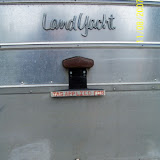Take a look at this photo from my great-aunt's scrapbook. If you click on it, it will open larger in another window. The "Uncle George" of the caption is George McWilliams, freed from slavery at the age of 9, in 1863. Some members of his family are on the porch of the slave cabin where I suppose George lived most of his life. How often would this family have had such a portrait taken? Look closely. A young white male has one arm around a younger man, possibly George II, and with his other hand he has his fist full of George's coat. I suppose this little white boy, a rascal for sure, is my grandfather, Bob Lee (Robert Lee) McWilliams, who disappeared from my father's life -- and my life -- when my father was 8 years old. As we say Down South, Bob Lee 'turned up dead' in the late 1970s in Salt Lake City. Word was, he was an alcoholic, and an abusive husband, who brought a lot of pain and misery to a lot of people. The Hebrew Bible says that the sins of the ancestors are visited upon the descendants from generation to generation. I consider the stories, told and untold, in my family and I believe this is true. And, yet, the drunkard womanizer, King David is the ancestor of the Christian Messiah. Irony makes such good storytelling. This story is about so much more than race and slavery; it includes layers and nuances of human misery. At one year, I ask myself, "What's the point?"
Tonight, I had a conversation with reporter Brandon Perry of the Indianapolis Recorder, the weekly paper of the African American community of Indianapolis (and beyond). Mr. Perry's article will be the fourth publication*, within two months, of the story of the meeting between Imam Mikal Saahir and me, one year ago, March 8, 2009.
One year later, I still find myself shaking my head over the unlikelihood of that meeting a year ago. Mr. Perry asked me what I would like for people to take away from our story. After a lot of rambling on, with some of my academic thoughts and personal reflections, I settled on this thought:
So much has happened since 1863, when the Emancipation Proclamation went into effect in North Alabama and Southern Tennessee, when my great-great-grandfather, James LaFayette McWilliams freed from slavery the nine-year-old George McWilliams. Let me break that down, in case it isn't clear. In 1863, the Emancipation Proclamation was enforced for Jim Fate McWilliams and other slave owners in the Tennessee Valley region. I do not for one moment think George McWilliams would have been freed from slavery any other way. There was no magnanimity in the action of Jim Fate McWilliams.
Now, on the one year mark, I have a lot more questions than I did on that day Mikal and I met for the first time. Firstly, why or how did his family come to know and hold and cherish this story of emancipation? I had no idea of this story, and could have lived out my remaining days without knowing it, had events not conspired (a G-d thing?) to bring us together in Indianapolis, IN, far away from Elkmont and Athens, in Limestone County, Alabama.
Secondly, what happened to little 9-year-old George on that day in 1863? He had a brother, bought by the McWilliams family at the same time, some time in their young childhoods. A third brother was bought by the Yarbrough family. What happened to him? Where did little George and his brother live? Who took care of these children? Were there other slaves in the McWilliams estate at the time? I know, from the photos gathered by MIkal's family, that George McWilliams continued to live on the McWilliams property, living in the cabin that was the slave quarters, at least according to tradition. Were there others? Did any adults, taking the McWilliams name, leave the estate and venture away from the others?
Finally, for today, how did Jim Fate McWilliams take the news of the enforcement of the E. P. back in 1863? He would have been a man in his 30s. What changed in his household, if anything did, because of the legal end to slavery?
I have none of these stories. The cloudy past of my father's "people," including the black McWilliamses, will most likely obscure this story for me for a long time. Now I have some questions for me.
What will I do with this information?
Why was my initial reaction to Mikal's introduction into my past a response from a place of guilt and shame? What is in this story that affects my ego to such an extent? Sure, it's all in the past and I can't influence it in any way. Seana said, on our vacation with friends in México last week, that I could work out my reparations with her. That was funny, a little twist on the question about, when will we ever be finished paying for the sins of the past? When will the learning be complete? Dear g-ds: if racism is over, then what kind of misery are we, in the majority, willing to continue to support in our cities? If racism is over, I need someone to explain to me what to do about this stain upon my name? If racism is over, what happened to the revolution? I missed it entirely.
What is the point of this story?
I told Brandon Perry that this story brings my situation as a white Southerner -- who witnessed the dismantling of Jim Crow and the growth of Civil Rights and my experiences in consciousness-raising efforts -- out to a place of new scrutiny, to be sure. I have my response, and it is my response. I do not speak for anyone else as I live through this awakening.
One of the main points I take away from this encounter and its ongoing revelations is a repetition of something I learned from Maya Angelou, Oprah Winfrey, and Henry Louis Gates. Human beings are 99.99% exactly the same on the chromosomal/genetic level. Without the statistically insignificant differences contained in the 1/100th of one percent amount of difference that might emerge as skin color, hair, eyes, etc., we are all the same. What violence and evil we have made of that 1/100th.
Another point is the closeness we share, unknowingly, with others around us. How amazing: Mikal Saahir and I, two McWilliamses with roots from the same county, met on a Sunday in Indianapolis, IN. Indianapolis: his home town for life, my new home since three years ago.
I gave up a while ago my firm grip on the personal G-d. Too much bad stuff happened all in a row, and my faith was not much help. Still, I am drawn to community, to people who gather in G-d's name. I am so glad that there was a place that Sunday morning, where people gathered to reflect upon the Spiritual DNA of the children of Sarah and Abraham.
What to make, then, of the meeting, that it happened at all? What's the point? Where will this journey take us from here? It is a small world -- we are all interconnected -- what happens to one affects all -- a rising tide lifts all boats -- I am sorry -- I forgive you -- these phrases are so common because theses kinds of little miracles happen so often.
What now? I am left with a feeling of Mystery, with a capital M, trembling before a grace that is beyond me, that blesses me in a particular way that feels very personal. Shall I take the Mystery personally?
*other publications:
Indianapolis Star
My corrections to the Star article are below on February 20, 2010
Focolare's Living City Magazine
Muslim Journal (article not posted online/essentially the same as Focolare's version)
Monday, March 8, 2010
Reflections at One Year
Labels:
Alabama,
Athens,
Elkmont,
genealogy,
George McWilliams,
Indianapolis,
McWilliams,
Robert Lee McWilliams,
slavery
Subscribe to:
Post Comments (Atom)




No comments:
Post a Comment
Welcome to my blog. I welcome your comments!